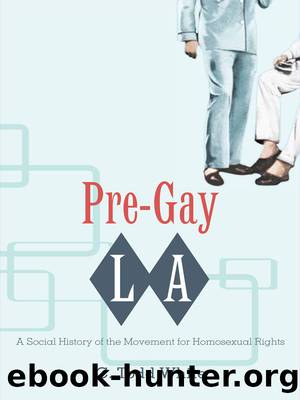Pre-Gay L.A. by C. Todd White

Author:C. Todd White
Language: eng
Format: epub
ISBN: 9780252092862
Publisher: University of Illinois Press
Published: 2012-08-15T00:00:00+00:00
Elections and Electioneering
In her famous study of the day-to-day operations at a Jewish center in Venice, California, ethnographer Barbara Myerhoff noted that elections were particularly emotional times for center personnel. Months before an actual election, electioneering became intense. âCoalitions were formed and reformed. Marginal members were assiduously wooed. Block votes of interest groups were sought. Every assembly of more than two was turned into an opportunity for speechifying.â She added that most âdefinitive decisionsâ were made at nomination meetings rather than at the elections themselves (1979, 120â21). This pattern also proved true in the case of ONE, but it was intensified in the fall of 1963 as tensions ran exceptionally high.
On November 24, ONEâs directors gathered for a nomination meeting to discuss possible candidates for any vacancies for voting members in anticipation of the annual meeting, scheduled two months hence. It soon became apparent that the six current voting members split evenly as to which candidates they would favor. Slater, Sanchez, and Steinert wanted Billy Glover elected. Glover had staunchly supported the magazine for years and assisted the corporation in many ways. The other three voting members, Boyfrank, Weaver, and Lambertâall the officersâopposed Glover but mildly favored Thelma Vargas, Lewis Bonham, Reuben Bush, and Bob Winn.3 Slaterâs group did not feel that any of these others had contributed enough to the organization to justify voting status and opposed each of them for this or other reasons. Most if not all directors agreed that two candidates discussed should be elected: Harry Hay and John Burnside. Getting those two on board was assured, provided they accepted. Before adjourning that night, the board agreed to place Burnside, Glover, and Hay on the ballot as primary candidates. They further agreed to vote on each candidate separately, one at a time, according to custom. Bonham, Bush, Vargas, and Winn would be on the ballot as alternates in case any of the three primary candidates declined nomination. Slater hoped to persuade Hay and Burnside to vote for Glover. Unless that happened, Gloverâs chances appeared dubious because the bylaws required a two-thirds majority vote to elect a new member. If all else failed, the Slater-Sanchez-Steinert coalition believed it could form a voting block, ensuring that none of Leggâs preferred alternate candidates could win election, either.
On January 12, 1964, Legg convened a directorsâ meeting at 5:10 p.m. Weaver, Steinert, Sanchez, and Boyfrank attended. Legg gave a financial report, and Weaver discussed taxation rules. They discussed a prior meeting (of January 5) as well as ONEâs upcoming European tour, which Rudi Steinert would direct. Next, Boyfrank abruptly announced his impending resignation because of ailing health. Boyfrank appears to have intended his resignation to take effect immediately, following adjournment. The directors agreed to ask Lewis Bonham, a Glendale resident, if he would accept nomination to the corporationâs voting membership. They would also ask Bonham to typeset the forthcoming article, âCrime against Nature.â This agreed, the session adjourned at 8:25 p.m.
Given the polarized state of affairs within ONE, it seems appropriate that the January 1964 issue of ONE Magazine was printed in stark black and white.
Download
This site does not store any files on its server. We only index and link to content provided by other sites. Please contact the content providers to delete copyright contents if any and email us, we'll remove relevant links or contents immediately.
The Secret History by Donna Tartt(16792)
The Social Justice Warrior Handbook by Lisa De Pasquale(11525)
Thirteen Reasons Why by Jay Asher(7873)
This Is How You Lose Her by Junot Diaz(5855)
Weapons of Math Destruction by Cathy O'Neil(5113)
Zero to One by Peter Thiel(4899)
The Myth of the Strong Leader by Archie Brown(4827)
Beartown by Fredrik Backman(4513)
Promise Me, Dad by Joe Biden(4504)
How Democracies Die by Steven Levitsky & Daniel Ziblatt(4477)
Stone's Rules by Roger Stone(4465)
The Fire Next Time by James Baldwin(4411)
100 Deadly Skills by Clint Emerson(4145)
A Higher Loyalty: Truth, Lies, and Leadership by James Comey(4083)
Rise and Kill First by Ronen Bergman(4075)
The David Icke Guide to the Global Conspiracy (and how to end it) by David Icke(3943)
The Farm by Tom Rob Smith(3925)
Secrecy World by Jake Bernstein(3838)
The Doomsday Machine by Daniel Ellsberg(3783)
